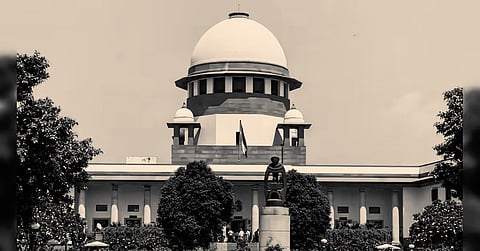

THE ATTORNEY GENERAL FOR INDIA R. Venkataramani on Tuesday while questioning the Supreme Court’s April 8, 2025, judgment laying down the timelines for the Governor to give assent to the Bills passed by the State legislatures, asked whether the Court could rewrite the provisions of the Constitution – particularly Articles 200 and 201 - through judicial intervention.
Opening the arguments before a five-judge Constitution Bench comprising Chief Justice B.R. Gavai, and Justices Surya Kant, Vikram Nath, Pamidighantam Sri Narasimha and Atul S Chandurkar, Attorney General asked, “Can the Court go to the extent where it says let me take pen and paper and rewrite the Constitution?”
He argued that in the case of the Tamil Nadu Governor, the top Court entered into the legislative domain and essentially rewrote Articles 200 and 201 by reading into them something which was not envisaged while the framing of the two provisions. Venkataramani argued that the issue dealt in the April 8 judgment should have been referred to a larger five-judge bench but this was not considered. He also pointed out that he had urged the two-judge bench to refer the issue to a larger bench.
However, the bench responded saying that the previous bench of Justices J.B. Pardiwala and R. Mahadevan had intervened and laid down the timelines only because the bills passed by the Tamil Nadu assembly and presented to the Governor for his assent were pending with him for a long time without any action. Justice Narasimha observed, “See the egregious situation where it had come to.. it was to remedy that situation that the court stepped in.. the bills were pending for so long.”
In the morning session of the hearing which commenced, senior advocates K.K. Venugopal, Abhishek Manu Singhvi and P. Wilson questioned the maintainability of the Presidential Reference. They argued that the Presidential Reference was a camouflaged appeal against the top Court’s judgment in the Tamil Nadu Governor case.
Kerala and Tamil Nadu had questioned the maintainability of the Presidential Reference.
Putting to rest any misgivings, the bench clarified that it was sitting in an advisory jurisdiction and not in appeal over the April 8, 2025, judgment in the Tamil Nadu Governor case which had laid down the timelines.
Addressing the arguments questioning the maintainability of the Presidential Reference, Venkataramani asserted that there can be no thwarting of the hearing on the Presidential Reference and it was up to the Court to answer or not to answer the reference after a detailed hearing of the arguments. The hearing cannot be stalled. The position taken by the Attorney General was supported by the Solicitor General Tushar Mehta, and senior advocates Harish Salve and Neeraj Kishan Kaul.
The Constitution Bench of the Supreme Court is hearing the Presidential Reference regarding the power of the judiciary to prescribe timelines for the President and Governors while dealing with Bills passed by State legislatures.
The States of Tamil Nadu and Kerala have urged the top Court to refuse to answer the Presidential Reference outright, contending that it violates the boundaries of Article 143 of the Constitution, which governs the advisory jurisdiction of the Supreme Court. The Kerala government has argued that such a Reference can only be made if the legal question is still undecided or res integra. It has said that constitutional questions raised in the present Reference—relating to the powers of the President and Governors under Articles 200 and 201—have already been settled by the Court.
The Kerala government has cited past precedents, including the Cauvery Water Disputes Tribunal Reference (1993), to argue that once the Supreme Court has delivered an authoritative ruling, the same issue cannot be reopened taking the Article 143 route. It has highlighted that three separate Constitution Bench judgments, including the April 8, 2025 ruling in the Tamil Nadu Governor case authored by Justice Pardiwala, had already settled the legal position on timelines for constitutional authorities in dealing with State legislations.
“When the Supreme Court in its adjudicatory jurisdiction pronounces its authoritative opinion on a question of law, it cannot be said that there is any doubt about the question or that the same remains undecided so as to warrant Presidential clarification,” the Kerala government has submitted.
The State further argued that if the Union government disagreed with the April 8 ruling, it should have filed a review or curative petition, rather than route its grievance through a Presidential Reference, which is meant for genuine legal ambiguities and not rehearing final judgments.
The Presidential Reference, made on May 15, 2025, questions whether the Court exceeded its jurisdiction by prescribing timelines for the President and Governors to act on State Bills, as well as whether the concept of “deemed assent” violates the doctrine of separation of powers. The Union government has defended the Reference, stating that the judiciary’s intervention encroached upon the constitutional functions of the executive.